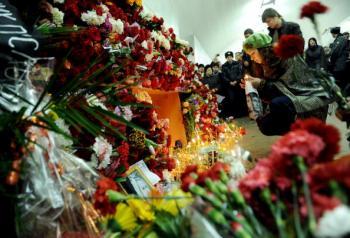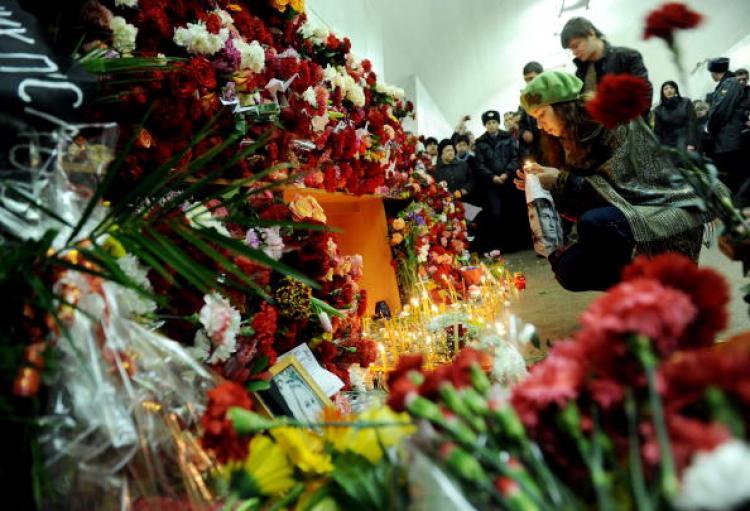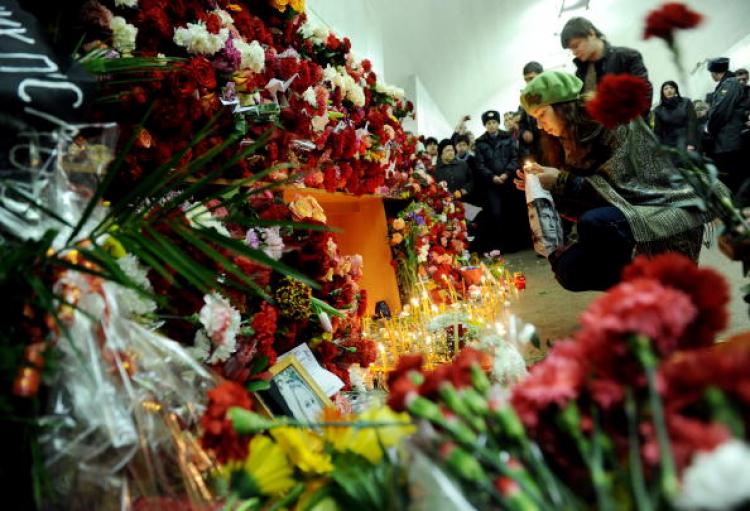Russia’s President Dmitriy Medvedev made a surprise visit to the southern province of Dagestan Makhachkala Thursday, calling on police and security forces to use “tougher measures” in fighting terrorism.
“The measures to fight terrorism should be expanded, they should be more effective, harsher, crueler,” he said during a televised meeting with local officials, according to an AP report.
At the same meeting, director of Russia’s Federal Security Service, Gen. Alexander Bortnikov, said that they were investigating the bomb attacks in the Moscow metro committed by the specific “bandit” groups linked to Northern Caucasus.
“We know the personalities of those organizers,” he said.
The Dagestan meeting was unscheduled—similar to when Medvedev visited last June when the minister of Internal Affairs was killed.
This week Russians were shocked by the two bombs attacks. The first occurred in the Moscow Metro on Monday morning when two female suicide bombers killed 39 people and injured about 100.
The other attack happened on Wednesday in Dagestan’s Kizljar, near the Chechen border, where two male suicide bombers killed 12 people, including nine policemen. The two men were transporting several hundreds of TNT by car when they were stopped by police.
Local officials said that accidents were linked to militias groups operating in the region.
The first funerals of the victims from Monday’s bombs attacks began on Thursday. According to the emergency ministry, 88 injured people remain hospitalized.
Claiming Responsibility
In video footage aired on Islamist Web site “Caucasus Center,” a speaker, who is allegedly the Northern Caucasus’s Muslim leader, Doku Umarov, claimed full responsibility for the bomb attacks in the Moscow metro on March 29.
He declared the blast was personally ordered by him and warned that attacks in Moscow “will continue.”
According to the man, the reason of the attacks was revenge for “the massacre organized by Russian security forces of the poorest Chechnya and Ingushetia’s civilians who gathered wild leek near the village of Arshty on Feb. 11 this year.”
Russian media has reported that Umarov is responsible for many attacks, including kidnapping, explosions, and taking hostages.
Earlier, a Georgian Russian-language television station aired an audio recording, in which Umarov allegedly claimed exactly the opposite and accused the Russian secret services for the killings.
Sergey Markedonov, an expert at the Institute for Political and Military Analysis, told the BBC that such messages were aimed at simply sowing fear among people, but it was clear that those responsible were from Northern Caucasus.
After-attack Measures
Russian security forces have begun mass checks of hotels in Moscow, newcomers in North Caucasus, and highways to and from the area.
Lawmakers are intending to reinforce the current legislation of transport security. If changes are confirmed, ordinary people will have to order a ticket containing personal data in order to travel throughout the country.
“The measures to fight terrorism should be expanded, they should be more effective, harsher, crueler,” he said during a televised meeting with local officials, according to an AP report.
At the same meeting, director of Russia’s Federal Security Service, Gen. Alexander Bortnikov, said that they were investigating the bomb attacks in the Moscow metro committed by the specific “bandit” groups linked to Northern Caucasus.
“We know the personalities of those organizers,” he said.
The Dagestan meeting was unscheduled—similar to when Medvedev visited last June when the minister of Internal Affairs was killed.
This week Russians were shocked by the two bombs attacks. The first occurred in the Moscow Metro on Monday morning when two female suicide bombers killed 39 people and injured about 100.
The other attack happened on Wednesday in Dagestan’s Kizljar, near the Chechen border, where two male suicide bombers killed 12 people, including nine policemen. The two men were transporting several hundreds of TNT by car when they were stopped by police.
Local officials said that accidents were linked to militias groups operating in the region.
The first funerals of the victims from Monday’s bombs attacks began on Thursday. According to the emergency ministry, 88 injured people remain hospitalized.
Claiming Responsibility
In video footage aired on Islamist Web site “Caucasus Center,” a speaker, who is allegedly the Northern Caucasus’s Muslim leader, Doku Umarov, claimed full responsibility for the bomb attacks in the Moscow metro on March 29.
He declared the blast was personally ordered by him and warned that attacks in Moscow “will continue.”
According to the man, the reason of the attacks was revenge for “the massacre organized by Russian security forces of the poorest Chechnya and Ingushetia’s civilians who gathered wild leek near the village of Arshty on Feb. 11 this year.”
Russian media has reported that Umarov is responsible for many attacks, including kidnapping, explosions, and taking hostages.
Earlier, a Georgian Russian-language television station aired an audio recording, in which Umarov allegedly claimed exactly the opposite and accused the Russian secret services for the killings.
Sergey Markedonov, an expert at the Institute for Political and Military Analysis, told the BBC that such messages were aimed at simply sowing fear among people, but it was clear that those responsible were from Northern Caucasus.
After-attack Measures
Russian security forces have begun mass checks of hotels in Moscow, newcomers in North Caucasus, and highways to and from the area.
Lawmakers are intending to reinforce the current legislation of transport security. If changes are confirmed, ordinary people will have to order a ticket containing personal data in order to travel throughout the country.






